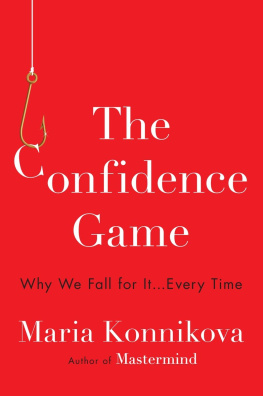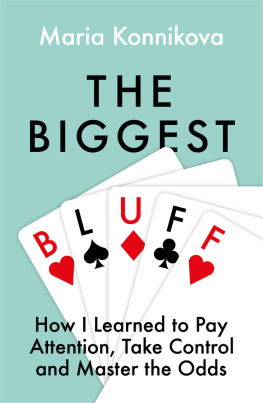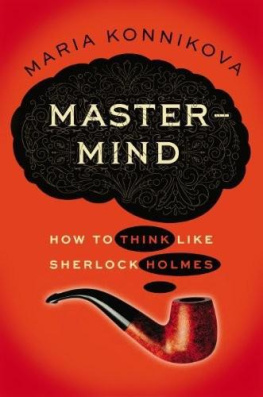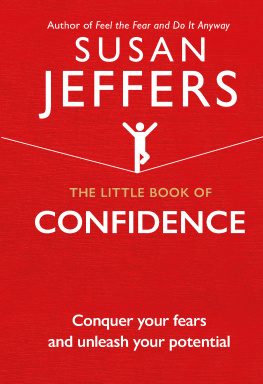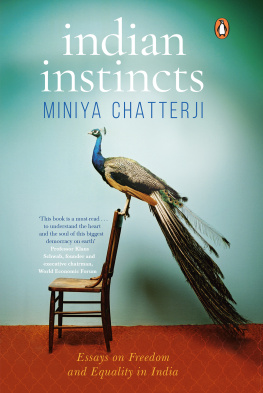ALSO BY MARIA KONNIKOVA
Mastermind
First published in Great Britain in 2016 by Canongate Books Ltd,
14 High Street, Edinburgh EH1 1TE
The digital edition first published by Canongate in 2012
www.canongate.co.uk
Copyright Maria Konnikova, 2016
The moral right of the author has been asserted
First published in 2016 in the United States by
Viking, an imprint of Penguin Random House,
375 Hudson St., New York, NY 10014, USA
British Library Cataloguing-in-Publication Data
A catalogue record for this book is available on request from the British Library
ISBN 978 1 78211 390 4
For my parents, Jane and Vitaly, who taught me that life is never fair, nothing comes for free, and theres no such thing as the exception to the rule
How cheerfully he seems to grin,
How neatly spreads his claws,
And welcomes little fishes in
With gently smiling jaws!
LEWIS CARROLL,
ALICES ADVENTURES IN WONDERLAND
CONTENTS
INTRODUCTION
The aristocrats of crime.
DAVID MAURER
D r. Joseph Cyr, a surgeon lieutenant of the Royal Canadian Navy, walked onto the deck of the HMCS Cayuga . It was September 1951, the second year of the Korean War, and the Cayuga was making her way north of the thirty-eighth parallel, just off the shore of North Korea. The morning had gone smoothly enough; no sickness, no injuries to report. But just as the afternoon was getting on, the lookouts spotted something that didnt quite fit with the watery landscape: a small, cramped Korean junk that was waving a flag and frantically making its way toward the ship.
Within the hour, the rickety boat had pulled up alongside the Cayuga . Inside was a mess of bodies, nineteen in all, piled together in obvious filth. They looked close to death. Mangled torsos, bloody, bleeding heads, limbs that turned the wrong way or failed to turn at all. Most of them were no more than boys. They had been caught in an ambush, a Korean liaison officer soon explained to the Cayuga s crew; the messy bullet and shrapnel wounds were the result. Thats why Dr. Cyr had been summoned from below deck: he was the only man with any medical qualification on board. He would have to operateand soon. Without his intervention, all nineteen men would very likely die. Dr. Cyr began to prepare his kit.
There was only one problem. Dr. Cyr didnt hold a medical degree, let alone the proper qualifications required to undertake complex surgery aboard a moving ship. In fact, hed never even graduated high school. And his real name wasnt Cyr. It was Ferdinand Waldo Demara, or, as he would eventually become known, the Great Impostorone of the most successful confidence artists of all time, memorialized, in part, in Robert Crichtons 1959 account The Great Impostor . His career would span decades, his disguises the full gamut of professional life. But nowhere was he more at home than in the guise of the master of human life, the doctor.
Over the next forty-eight hours, Demara would somehow fake his way through the surgeries, with the help of a medical textbook, a field guide he had persuaded a fellow physician back in Ontario to create for the troops in the event a doctor wasnt readily available, copious antibiotics (for the patients) and alcohol (for himself), and a healthy dose of supreme confidence in his own abilities. After all, hed been a doctor before. Not to mention a psychologist. And a professor. And a monk (many monks, in fact). And the founder of a religious college. Why couldnt he be a surgeon?
As Demara performed his medical miracles on the high seas, makeshift operating table tied down to protect the patients from the roll of the waves, a zealous young press officer wandered the decks in search of a story. The home office was getting on his back. They needed good copy. He needed good copy. Little of note had been happening for weeks. He was, he joked to his shipmates, practically starving for news. When word of the Korean rescue spread among the crew, it was all he could do to hide his excitement. Dr. Cyrs story was fantastic. It was, indeed, perfect. Cyr hadnt been required to help the enemy, but his honorable nature had compelled him to do so. And with what results. Nineteen surgeries. And nineteen men departing the Cayuga in far better shape than theyd arrived. Would the good doctor agree to a profile, to commemorate the momentous events of the week?
Who was Demara to resist? He had grown so sure of his invulnerability, so confident in the borrowed skin of Joseph Cyr, MD, that no amount of media attention was too much. And he had performed some pretty masterful operations, if he might say so himself. Dispatches about the great feats of Dr. Cyr soon spread throughout Canada.
Dr. Joseph Cyr, original version, felt his patience running out. It was October 23, and there he was, sitting quietly in Edmunston, trying his damnedest to read a book in peace. But they simply wouldnt leave him alone. The phone was going crazy, ringing the second he replaced the receiver. Was he the doctor in Korea? the well-intentioned callers wanted to know. Was it his son? Or another relative? No, no, he told anyone who bothered to listen. No relation. There were many Cyrs out there, and many Joseph Cyrs. It was not he.
A few hours later, Cyr received another call, this time from a good friend who now read aloud the miracle doctors credentials. There may be many Joseph Cyrs, but this particular one boasted a background identical to his own. At some point, coincidence just didnt cut it. Cyr asked his friend for a photograph.
Surely there was some mistake. He knew precisely who this was. Wait, this is my friend, Brother John Payne of the Brothers of Christian Instruction, he said, the surprise evident in his voice. Brother Payne had been a novice when Cyr knew him. Hed taken the name after shedding his secular lifeand that life, Cyr well recalled, was a medical one much like his own. Dr. Cecil B. Hamann, he believed the mans original name was. But why, even if he had returned once more to medicine, would he ever use Cyrs name instead? Surely his own medical credentials were enough. Demaras deception rapidly began to unravel.
And unravel it did. But his eventual dismissal from the navy was far from signaling the end of his career. Profoundly embarrassedthe future of the nations defense was on its shoulders, and it couldnt even manage the security of its own personnel?the navy did not press charges. Demara-alias-Cyr was quietly dismissed and asked to leave the country. He was only too happy to oblige, and despite his newfound, and short-lived, notoriety, he would go on to successfully impersonate an entire panoply of humanity, from prison warden to instructor at a school for mentally retarded children to humble English teacher to civil engineer who was almost awarded a contract to build a large bridge in Mexico. By the time he died, over thirty years later, Dr. Cyr would be but one of the dozens of aliases that peppered Demaras history. Among them: that of his own biographer, Robert Crichton, an alias he assumed soon after the books publication, and long before the end of his career as an impostor.
Time and time again, DemaraFred to those who knew him undisguisedfound himself in positions of the highest authority, in charge of human minds in the classroom, bodies in the prison system, lives on the decks of the Cayuga . Time and time again, he would be exposed, only to go back and succeed, yet again, at inveigling those around him.




